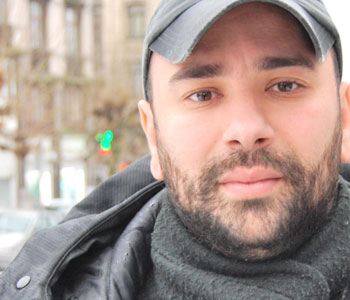Nabil Ben Yadir • Director
"France didn’t know how to accept the extended hand before it became a raised fist"
- After Les Barons, a surprise box-office success in Belgium in 2010, Nabil Ben Yadir returns with The Marchers, an ambitious historical film about the Beurs’ March.

Cineuropa: How did you get onto the project of The Marchers?
Nabil Ben Yadir: Nader Boussandel, the main actor in Les Barons [+see also:
film review
trailer
Interview with director and actress of…
interview: Nabil Ben Yadir
film profile], introduced me to my co-screenwriter, Nadia Lakhdar, who had been keeping the project in a drawer. When I discovered the story, of which I only knew a small part, I let myself be won over by the subject, this apolitical march, from the suburbs, inspired by the non-violent protests of Gandhi…
How do you give yourself liberties with the narration when telling a true story?
You focus on the great History: the towns, the march of the torches, the return to Lyon, the death of Habib Grimzi, all these images that pull you back to reality... But at the start in Marseilles, there was a group of 32, and we obviously could not make a movie with 32 characters. We thus created 10 characters around which we built short stories.
There are common themes between Les Barons and The Marchers
Both films deal with friendship and share underlying themes. But Les Barons stay where they are, the marchers cross France on foot.
The film’s optimism, or that of the characters, doesn’t account for much in the face of what is left after 30 years.
The end of the story is the hopefull visit of the protagonists to the Elysée, but we couldn’t end with that! That’s what made me want to make the film: they are so happy to meet Mitterrand to change things, but 30 years later, where are we? When we see the far right movement, racist crimes, what is happening in 2013... This is also why the film is beyond our grasp, as directors, actors or technicians.
The hero asks himself if by the year 2000, there won’t be more Tony Montanas (ed. the violent main character of Scarface) than Gandhis: what do you think?
I imagine that everyone has their own answer, even if obviously the Gandhis are becoming a rare species... That’s what the character of Lubna Azabal feels in the film: France needs to accept the extended hand before it becomes a raised fist. And in my opinion, France didn’t manage to seize this opportunity. But it’s a matter of opinion, and mood. Some people see raised fists more than they do extended hands, and vice versa.
Is the situation any different in Belgium?
There are common aspects, even if each country has its own history. France’s relationship to the popular suburbs isn’t far from that of Belgium. At the time, the young people had a very naïve and abstract message: they wanted a march of freedom. They just wanted to be considered French. Today, who considers themselves Belgian in those neighbourhoods, who is left to call themselves Belgians? Some policies have failed.
One of the characters says: "France is my bled". Could we still hear that today?
That was 1983. The idea was to reinstate the pride of the country these young people belonged to. But just by talking to these young people about the "country where they were born" or worse "their host country", they are being ostracized. You wouldn’t say that to a French person, would you? How come there is a category of people to whom we feel comfortable asking such questions? We filmed in these neighbourhoods. The opening of the film is set in Clichy-sous-Bois, where the riots started a few years ago. I would love to take a Japanese tourist there and tell him we’re only 15 minutes away from Paris. It’s incredible to what extent these neighbourhoods have been abandoned. Just like the film’s youth who never left Les Minguettes before, it’s not always that easy to get out of those neighbourhoods.
What are your next projects?
My next film focuses on Belgium, Flanders and Wallonia. A film in both languages, about a father and son, and separatism. A dark movie.
Did you enjoy reading this article? Please subscribe to our newsletter to receive more stories like this directly in your inbox.
















